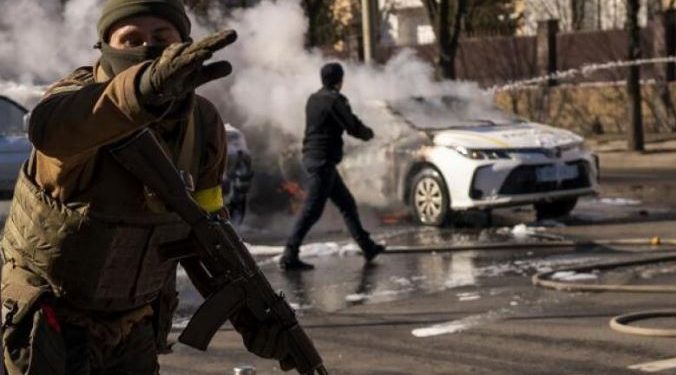Kyiv: Russia-Ukraine war: Desperate Ukrainians seek escape routes Ukraine banned wheat exports as civilians sought escape routes and concerns intensified over safety at the embattled country’s nuclear plants, including the decommissioned Chernobyl site.
As the Russian invasion rounds out its second week, feeding the desperate populace became an increasingly critical concern. Ukraine’s government banned the export of wheat crucial to global food supplies in an effort to stave off food shortages and hunger inside the country. Safety at Chernobyl, which has been under Russian control, rose as yet another worry as the site’s power ran out and it operated on emergency generators.
In the days since Russia launched war on Ukraine, some 2 million people have fled the country, nearly half of them children. Russian troops have captured swaths of territory in the south, but have faced fierce Ukrainian resistance in other regions.
Life has become increasingly desperate in cities cut from electricity and facing food and medicine shortages. The port city of Mariupol is particularly devastated, lacking running water, heat, sanitary systems and phone service.
ARE CIVILIANS BEING SAFELY EVACUATED?
Civilian evacuations were expected in a number of areas, including from the northeastern border city of Sumy, which saw 5,000 people evacuated safely on Tuesday. Nearly two dozen buses carrying aid to the city are anticipated to return full with evacuated residents, Ukrainian officials say.
Ukrainian President Volodymyr Zelenskyy said efforts were being made Wednesday to evacuate some 18,000 people from embattled towns in the Kyiv region to the capital itself. Speaking in Russian, he appealed to Russian soldiers to save themselves and “just go home.”
Other routes are hoped for out of Mariupol, Enerhodar in the south, Volnovakha in the southeast and Izyum in the east during a 12-hour-long ceasefire Wednesday. Civilians would be led to places in Ukraine held by the government.
Elsewhere, Ukrainian officials said civilians, among them children, were killed by Russian firepower in the town of Chuhuiv late Tuesday and in the city of Malyn, to the west of Kyiv.
WHAT HAS THE AP DIRECTLY WITNESSED OR CONFIRMED ELSEWHERE IN UKRAINE?
Civilians from towns northwest of the capital made their way toward Kyiv Wednesday as part of a humanitarian corridor, with firefighters and police helping people carrying their animals and belongings cross over a small river via a damaged bridge.
In Kyiv, air raid sirens could be heard Wednesday morning before an all-clear was issued. Families with small children continue to seek refuge inside a subway station to escape the sounds of war above. One university student told the AP that people go home from time to time to shower and get food only.
In the encircled port city of Mariupol, women and children gathered in a basement shelter as outgoing artillery fire blazed in the distance.
A Ukrainian soldier was seen telling people to remain united as a store was being raided for essential items. “You don’t need to panic. Please don’t steal everything. You will live here together. This is your home,” he was heard saying.
People have been collecting water from streams or melting snow in Mariupol, which has a population of just under half a million. Power cuts mean that many residents have lost internet access and now rely on their car radios for Russian-controlled broadcasts.
WHAT’S HAPPENING AT UKRAINIAN NUCLEAR PLANTS?
All Chernobyl nuclear plant facilities are without power and the diesel generators have fuel for 48 hours, Ukraine’s main grid operator said. The state communications agency says the power outage could put systems for cooling nuclear material at risk. The site has been under control of Russian troops since last week.
Ukraine’s nuclear regulator says remote data transmission from monitoring systems at Chernobyl have been lost.
The Vienna-based U.N. Nuclear watchdog said it saw no critical impact on safety at Chernobyl because there could be “effective heat removal without need for electrical supply” from spent nuclear fuel at the site.
Ukraine’s energy minister says Ukrainian staff at the Zaporizhzhia nuclear plant, the largest in Europe, are physically and emotionally exhausted. He said about 500 Russian soldiers and 50 pieces of heavy equipment are inside the station, which the Russians took control of in an attack last week.
WHAT’S THE VIEW FROM INSIDE RUSSIA?
Russia has cracked down on independent reporting and blocked access to Russian-language journalism by multiple foreign news outlets. Scattered protests against the war continue in the country, but sources of information about what is happening are diminishing for people inside Russia.
The U.S. Will ban all Russian oil imports, even if it means rising costs for Americans, particularly at the gas pump. Shell also said it will stop buying Russian oil.
McDonald’s, Starbucks, Coca-Cola, PepsiCo and General Electric all announced Tuesday they’re temporarily suspending business in Russia. Some companies, such as McDonald’s, say they will keep paying wages for now to their workers in Russia.
Russia’s Central Bank sharply tightened currency restrictions in ways not seen since Soviet times. It ordered the country’s commercial banks to cap the amount clients can withdraw from their hard currency deposits at $10,000 in U.S. Dollars. Any withdrawals above that amount would be converted to rubles at the current exchange rates.
AP






































